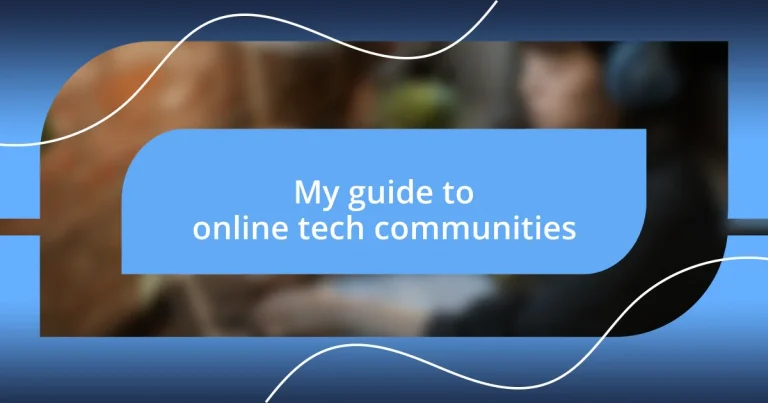Key takeaways:
- Online tech communities foster knowledge sharing, mentorship, and networking, enhancing individual growth and collaboration.
- Active engagement and genuine interactions within these communities can deepen connections and create a supportive environment.
- Finding the right community that aligns with interests and offers diverse perspectives is crucial for a fulfilling tech experience.
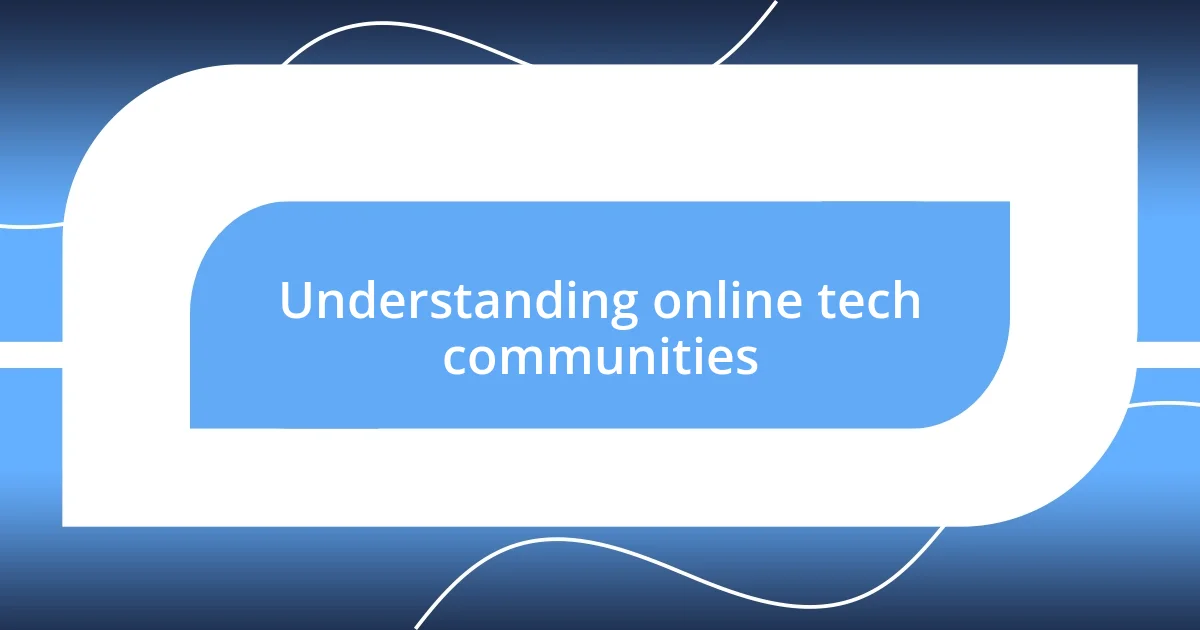
Understanding online tech communities
Online tech communities are fascinating spaces where like-minded individuals gather to share knowledge, seek help, and collaborate on projects. I remember joining my first community, feeling a rush of excitement as I connected with others who shared my passion for coding. Have you ever felt that thrill when discussing your favorite tech topics with people who genuinely understand you?
These communities often have a unique culture shaped by their members. For instance, I’ve noticed how each group develops its own set of norms around communication and support. It’s so heartening to see how experienced members take the time to mentor newcomers, fostering an environment of growth and collaboration. Isn’t it inspiring when people come together to uplift each other?
What’s particularly intriguing is how these spaces can both empower and challenge us. I once encountered a heated debate about a controversial technology, and while it was intense, it pushed me to articulate my views more clearly. Have you experienced a moment where a discussion in an online community transformed your understanding of a topic? It’s these interactions that often deepen our appreciation for not just the technology itself, but also the diverse perspectives within our communities.
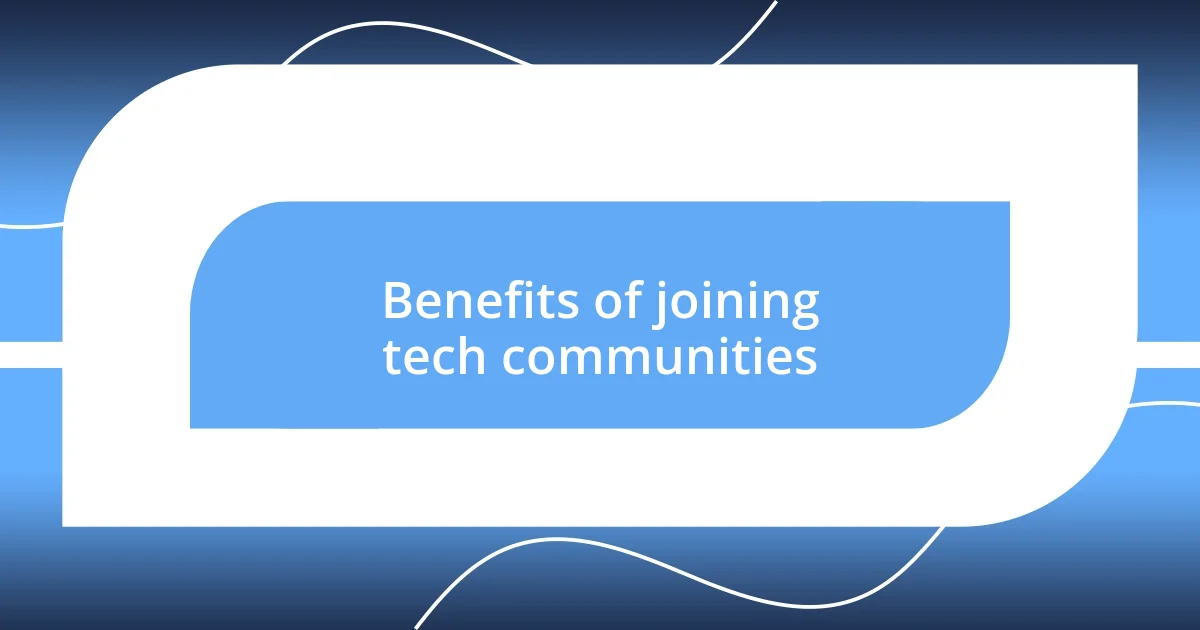
Benefits of joining tech communities
Joining tech communities comes with a wealth of advantages that can significantly enhance your experience and growth in the tech world. For me, one of the biggest benefits is networking. When I joined my first online community, I found connections that led to collaboration opportunities, job referrals, and friendships that went beyond digital interactions. It’s incredible how a simple comment on a forum can evolve into a career breakthrough or mentorship relationship.
Moreover, being part of these communities allows me to stay updated on the latest trends and tools in the tech landscape. I remember discovering a new programming language through a discussion thread, which later became valuable in my projects. When you’re surrounded by passionate individuals who share up-to-date insights, you can’t help but learn something new. Doesn’t it feel great to expand your knowledge through real conversations rather than just reading articles alone?
Lastly, the sense of belonging I experienced in tech communities is priceless. I recall a time when I faced a frustrating bug in my code, and reaching out to my community saved my sanity. Fellow members jumped in to help, sharing their own solutions and encouraging me not to give up. That spirit of camaraderie is what makes these spaces so special. Have you ever felt that sense of support from your peers in a similar situation? It’s those moments of connection that truly clarify the significance of joining online tech communities.
| Benefit | Description |
|---|---|
| Networking | Connecting with individuals for collaboration and career opportunities. |
| Learning | Staying informed on the latest tech trends and tools through discussions. |
| Support | Experiencing a sense of community and assistance during challenges. |
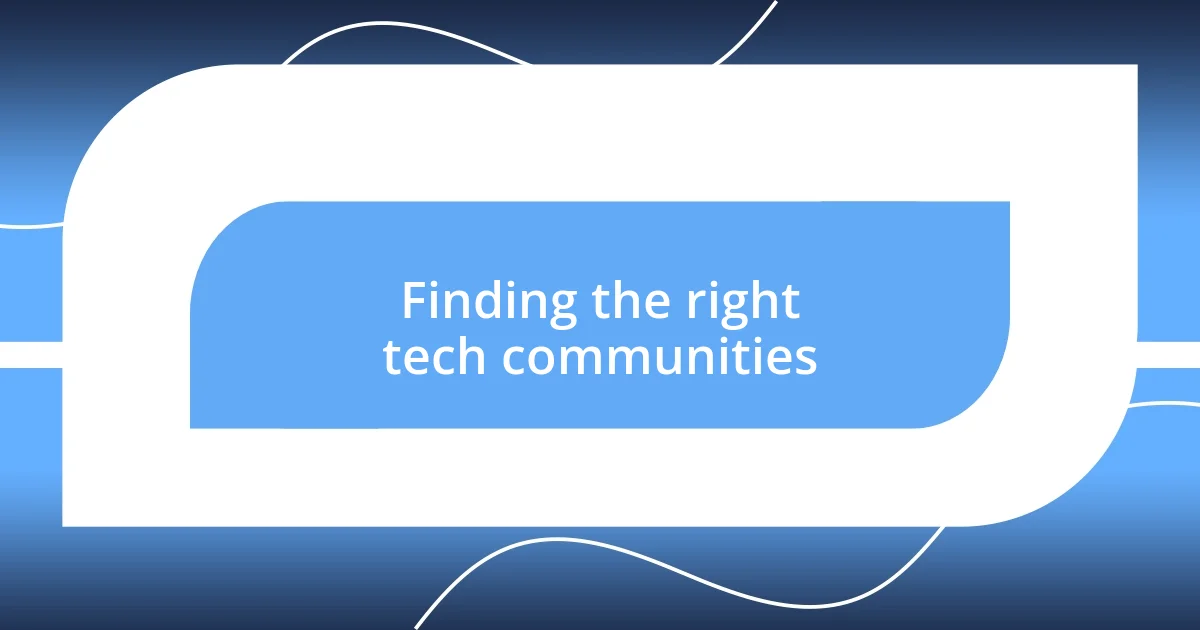
Finding the right tech communities
Finding the right tech community can feel overwhelming at first, but it’s crucial for your growth and enjoyment in the tech world. I’ll never forget the moment I stumbled upon a niche community centered around microcontrollers. The excitement of finding a group that not only shared my interest but also had members varying from beginners to seasoned experts was unforgettable. Looking back, it significantly shaped my understanding and skills in electronics. Don’t shy away from exploring different spaces until you find that perfect fit.
Here are a few pointers to help you identify the right tech communities for you:
- Interest Alignment: Look for communities that focus on topics you’re passionate about, whether it’s web development, AI, or hardware hacking.
- Engagement Level: Choose communities where members actively engage in discussions and share resources rather than just lurking.
- Support Culture: Seek out groups known for their supportive atmosphere, where members are willing to help you on your journey, just like I experienced when I sought advice on a particularly tricky project.
- Diversity of Experience: A mix of backgrounds, from beginners to experts, enriches the community, offering varied perspectives and learning opportunities.
- Platform Preference: Decide whether you prefer forums, social media groups, or Discord servers based on your comfort level and accessibility.
By focusing on these aspects, you’ll set yourself up for a fulfilling experience as you navigate the world of tech communities.
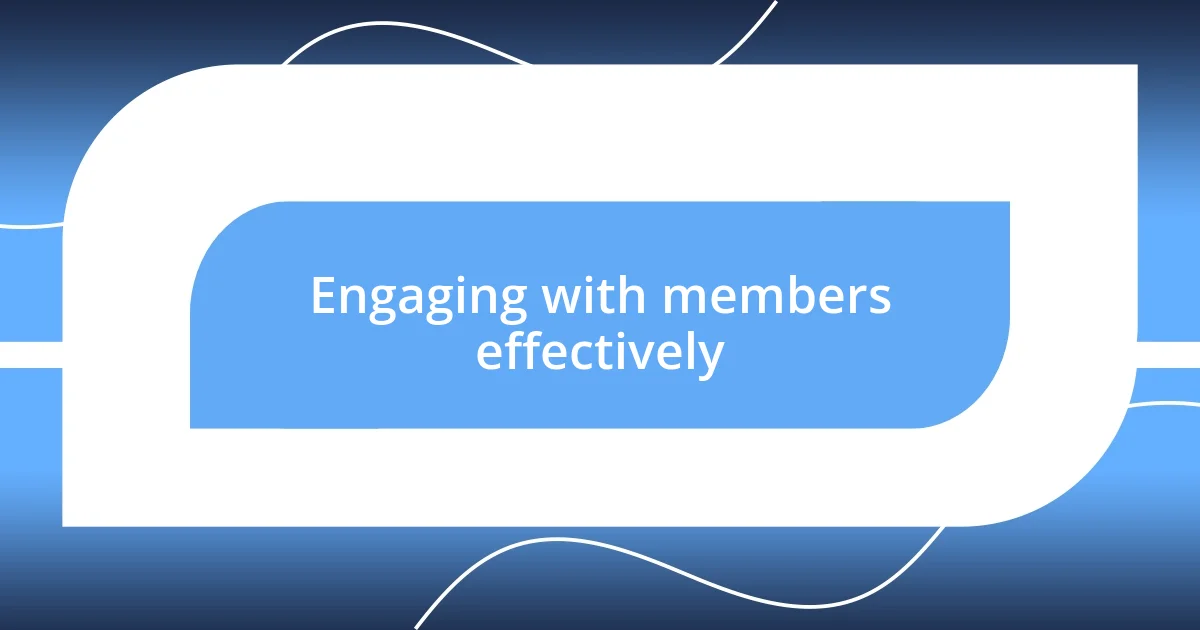
Engaging with members effectively
Engaging effectively with members in online tech communities is an art. From my experience, actively contributing to conversations sets a positive tone. I recall joining a thread where someone asked about a complex algorithm; I shared my insights, and the dialogue that ensued not only enhanced my understanding but also formed valuable connections with others facing the same challenges. Isn’t it rewarding when sharing your knowledge leads to a collaborative atmosphere?
Moreover, showing genuine interest in others’ contributions can spark deeper connections. I’ve often found that when I take the time to acknowledge someone else’s input or ask follow-up questions, it enriches the interaction. I remember a moment when a fellow member posted about their struggles with a project. My supportive comment led to a heartfelt exchange, culminating in a friendship that continues to this day. Have you ever experienced that sense of camaraderie simply by being present and responsive?
Lastly, embracing vulnerability can foster stronger ties among members. Early in my journey, I hesitated to ask for help with a coding issue, fearing it would portray weakness. But when I finally reached out, the flood of encouragement and support made me realize that everyone struggles at times. It’s a shared experience that truly humanizes our interactions online. Isn’t it powerful how admitting our challenges can create a safe space for others to do the same? This mutual openness nurtures a community where everyone feels welcome.
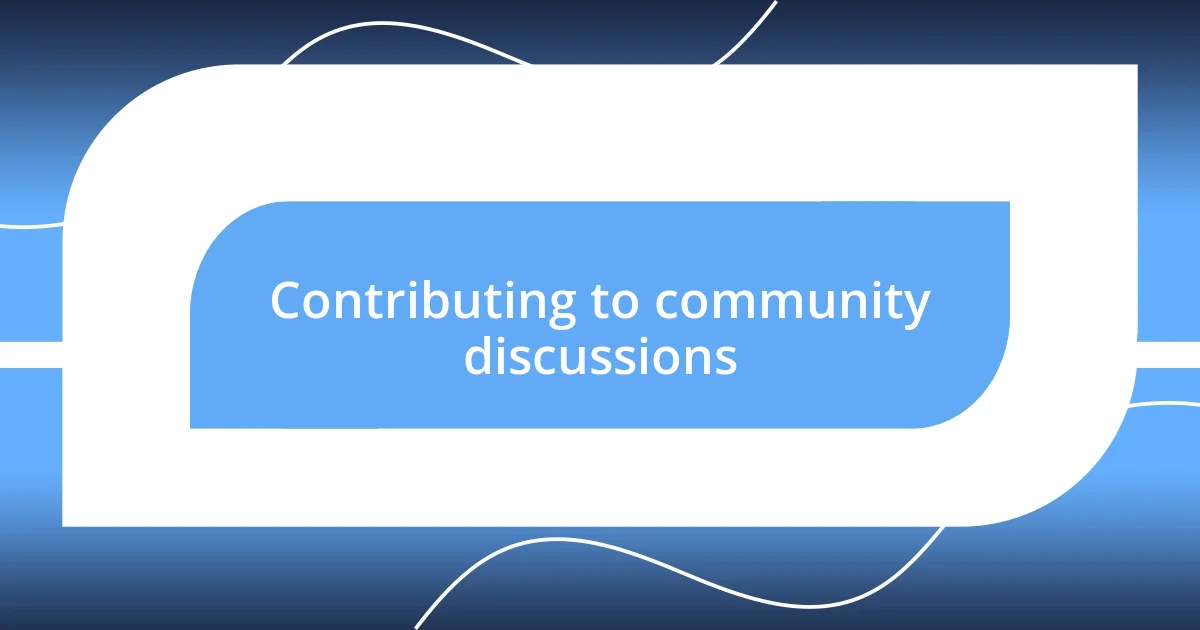
Contributing to community discussions
Contributing to community discussions requires a blend of confidence and authenticity. I remember the first time I posted in a forum about a project I was struggling with. Sharing my uncertainties felt daunting, yet the supportive responses I received uplifted my spirits—it was a turning point for me. It taught me that vulnerability not only invites help but also deepens connections. Isn’t it interesting how admitting we’re not experts yet can lead to richer conversations?
When I participate in discussions, I often try to relate my experiences to the topics at hand. For instance, during a debate on programming languages, I shared my journey of switching from Python to Rust. Although my transition was filled with hurdles, it sparked an engaging dialogue about overcoming obstacles in learning. This kind of storytelling not only makes my points relatable, but it also encourages others to share their own journeys. Have you ever noticed how personal stories can transform a simple exchange into a deeper conversation?
Lastly, I find that following up on discussions can leave a lasting impact. After a heated exchange on a new technology, I reached out to a few members via direct messages, thanking them for their insights and asking for further advice. This small gesture not only strengthened our bonds but also kept the conversation alive, promoting an environment where everyone felt valued and heard. Have you tried reaching out personally? Sometimes, it’s those little steps that make the biggest difference in cultivating a thriving community interaction.
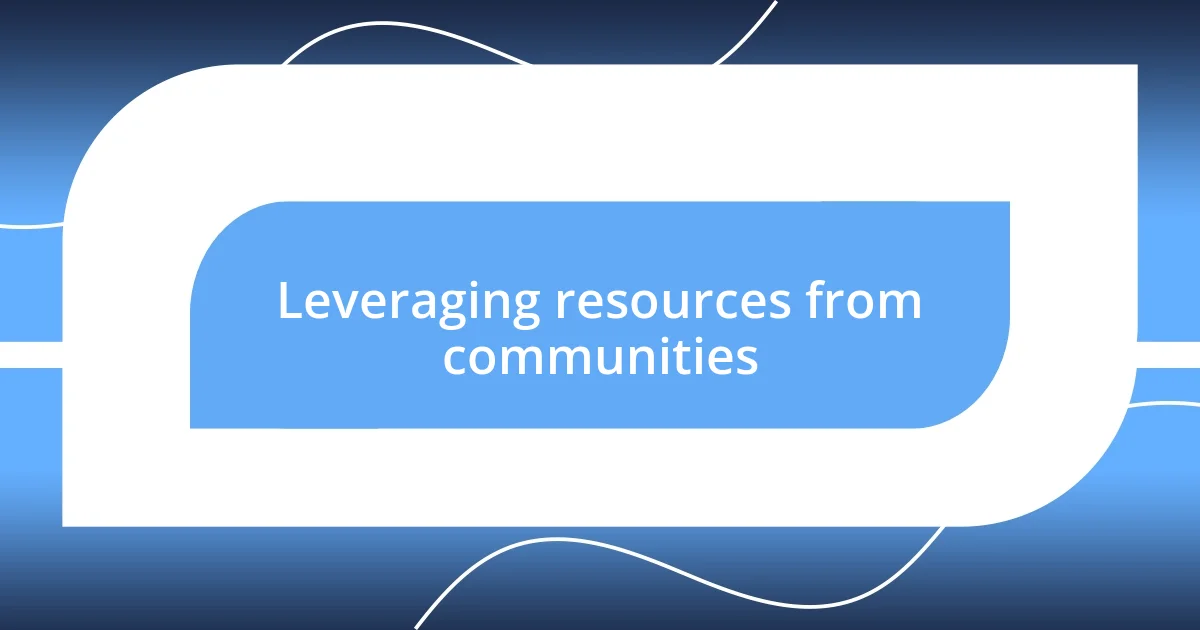
Leveraging resources from communities
Leveraging resources from communities is about more than just passive observation; it’s about engagement and taking action. I remember joining an online coding group where members regularly shared valuable resources like articles, cheat sheets, and tutorials. One day, after someone posted a particularly insightful article on API design, I took the initiative to apply those principles to my project. Not only did it enhance my understanding, but it also improved my project significantly. Isn’t it incredible how a simple share can lead to profound learning experiences?
Every community has its unique treasure trove of knowledge, which I often see as a kind of crowd-sourced library. I’ve utilized platforms like GitHub, where users contribute to open-source projects. One time, I stumbled across a repository addressing a common problem I had faced. By navigating through the issues and discussions, I found solutions I hadn’t considered before. This discovery reminded me of the importance of actively searching for help within these digital havens. Have you ever discovered a game-changing resource just by being curious and digging a little deeper?
The camaraderie in online communities also makes resource-sharing feel rewarding. When I shared a tool that helped streamline my workflow, members started flooding the thread with their own recommendations. This collective wisdom expanded my toolkit beyond what I thought was possible. It’s surprising to see how quickly enthusiasm builds when people share their go-to resources. Have you felt that rush of excitement when others appreciate your contribution? It solidifies the idea that we’re all on this journey together, learning and growing side by side.
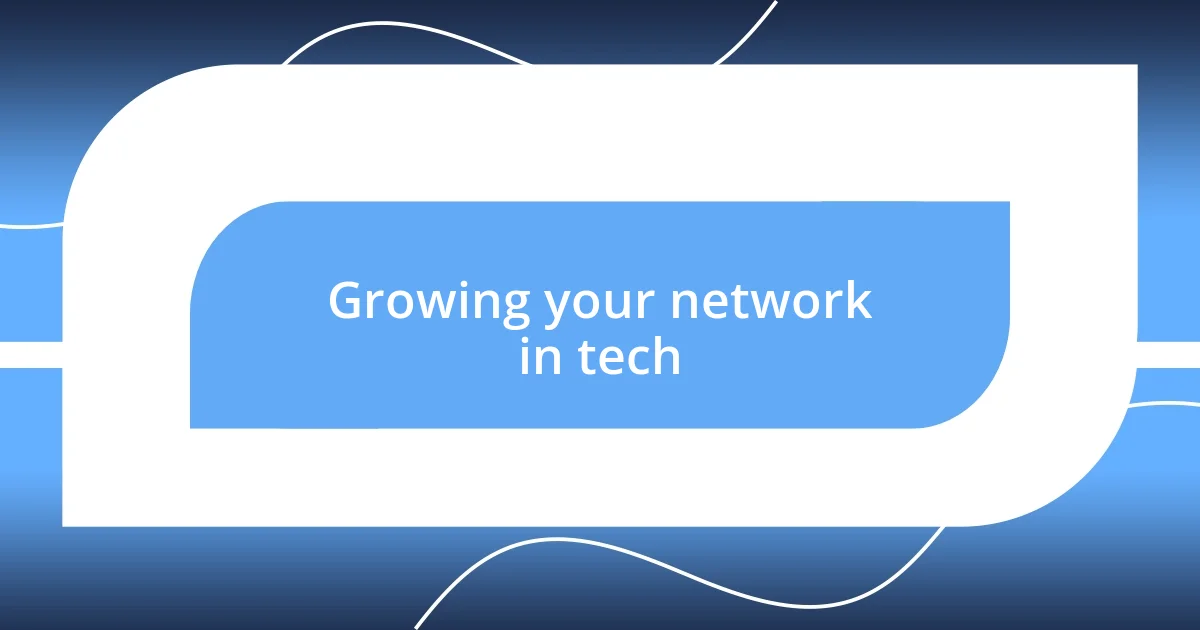
Growing your network in tech
Growing your network in tech can be incredibly rewarding, but it often requires a proactive approach. I vividly recall my first tech conference where I struck up a conversation with a fellow attendee over lunch. We discovered we both faced similar challenges in our careers and exchanged contact information. That one connection grew into a mentorship, and to this day, I still reach out for advice on projects. Have you ever considered how a single conversation can open up doors you didn’t even know existed?
Attending meetups, whether virtual or in person, has dramatically expanded my professional circle. Just last month, I participated in a local hackathon, and while I initially thought it was just about coding, it turned out to be a fantastic networking opportunity. I collaborated with people from diverse backgrounds, and we’re now part of an ongoing project together. It’s fascinating to think about how these shared experiences create bonds that can evolve into collaborations. Have you tried stepping outside of your comfort zone at such events?
Maintaining connections is as vital as making them. After forming new relationships, I like to schedule regular check-ins with my contacts. Not long ago, I took a moment to follow up with a person I met at a seminar. We discussed our current projects and exchanged insights, rejuvenating our connection. I find that just a simple message can show you value the relationship. Isn’t it amazing how a little effort can transform a fleeting encounter into a lasting professional bond?












